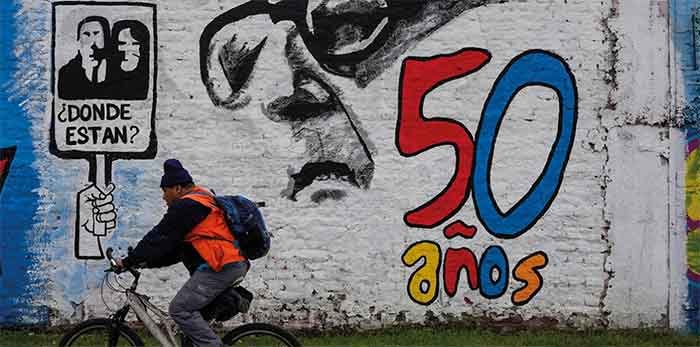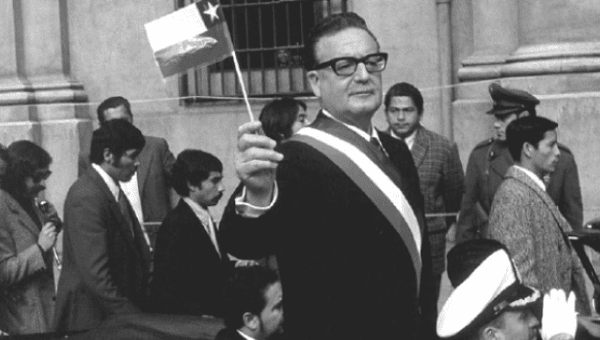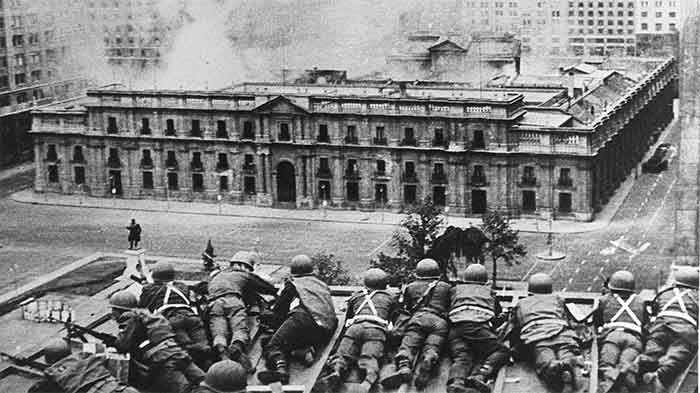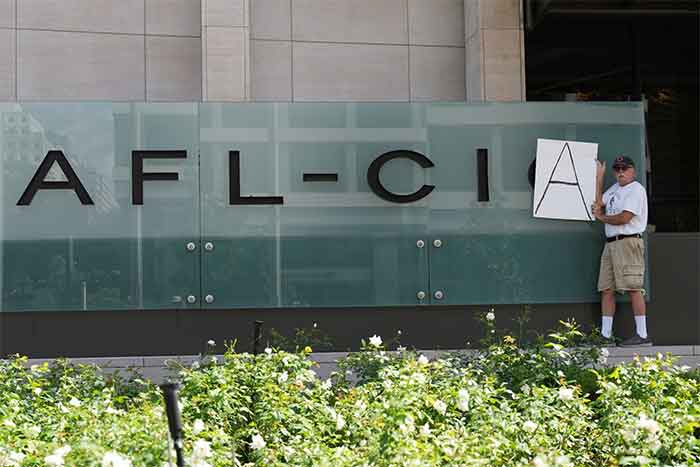Dr Francisco Dominguez reflects on the 1973 overthrow of democratically elected socialist president Salvador Allende and the long shadow of neoliberalism

On the cold morning of September 11, 50 years ago in Santiago, Chile, armed forces commander in chief Augusto Pinochet led a bloody military coup against democratically elected socialist president Salvador Allende.
Tanks had the presidential palace, La Moneda, surrounded, Pinochet demanded Allende surrender and resign from the presidency, handing power to the armed forces.
President Allende refused and bravely resisted gun in hand; Pinochet, most likely prompted by the US, ordered the air force to bomb the palace. UK-built Hawker-Hunter war planes repeatedly hit the palace with missiles, setting it alight.
The image of La Moneda in flames, following the brutal aerial attack, has remained the indelible symbol of the destruction of Chile’s democratic effort to build a better, socially just, society.
The US-led coup d’etat would install a brutal US-directed military dictatorship, headed by Pinochet, followed by the “pioneering” imposition of an economic model of accumulation that would become universally adopted by world capital everywhere, and which most of humanity has been enduring ever since: neoliberalism.
In Chile, the US-guided dictatorship of Pinochet led to the cold-blooded assassination of Salvador Allende and in 17 years to the deaths of nearly 5,000 Chileans, many after suffering unspeakable forms of torture with many “disappeared.”
The military arrested, horribly tortured, broke the fingers and riddled the body with bullets of radical poetic singer Victor Jara.
Apart from composing and singing inspirational songs of social redemption and the struggle for justice, he committed no crime whatsoever (Joan Jara, Victor: An Unifinished Song, 1998).
After “9/11,” a wave of US-led military golpes swept Latin America “tasked” with the twin aims of imposing neoliberalism and the physical eradication of progressive social movements and parties.
In Argentina, another US-led military dictatorship assassinated 32,000 mostly young people in only six years (1976-83). Mass challenges in Central America under US steering were also brutally crushed.
The Sandinista revolution in Nicaragua (1979-90) was subjected to a US war of attrition by proxy leading to the massacre of at least 50,000 citizens (workers, peasants, nurses, literacy volunteers) at the hands of US-financed, US-trained and US-armed Contras.
In neighbouring El Salvador and Guatemala, US-trained, US-financed and US-armed death squads assassinated 80,000 and 120,000 people, respectively.
The victims were mostly innocent civilians but it also included priests and nuns. It is when US State Department official Elliott Abrams acquired notoriety: all the killings took place under his watch.
The consequences for the region as a whole were catastrophic. Social exclusion and the rise of the informal sector of the economy were staggering: large sections of the people had to eke out a highly precarious living on the edges of society, many from scouring rubbish bins.
By 1998, the rate of poverty in Latin America had reached over 48 per cent, that is, nearly half its population.
Pundits and specialists refer to this period as the “lost decade.” All indexes, infant and maternal mortality, life expectancy, unemployment, average incomes and wages, and health standards in general, drastically worsened.
However there was a shrinking minority at the top, which in complicity and together with multinational companies, massively benefited.
This was exactly the opposite of what neoliberal theory predicted — instead of wealth from the top trickling down to the bottom, there was in fact a trickling up from the bottom poor to the richest 1 per cent.
Both local oligarchies and multinational companies reaped rich pickings from the wave of privatisations that privatised just about everything they could lay their greedy hands on: state companies and natural resources.
In Chile, all water, rivers, lakes and the sea are private property. Had they had the technology they would have privatised the air we breathe. The “cowboy” US joined forces with “civilised” Europe to pillage Latin America.
The inevitable resistance stemming from society was meted out with systemic repression not only in Chile but also elsewhere in a co-ordinated manner.
Henry Kissinger, architect of Chile’s coup, set up a sinister co-ordination to eliminate all and any actual or potential focuses of opposition.
“Operation Condor” has been correctly characterised as “a criminal conspiracy to forcibly disappear people.” It involved the governments and intelligence services of Chile, Argentina, Uruguay, Paraguay, Bolivia, Brazil and the US, tasked with persecuting and eliminating political, trade union and student activists.
In 2019, Chile’s long neoliberal conformist torpor was shaken to its foundations by a “estallido social” (social uprising) initiated by secondary school kids.
It was so powerful and Chile’s mainstream so rotten that it took the country to the brink of a restart of the 1970-73 democratic revolution Allende sought to bring about, seriously threatening to sweep away neoliberalism in its wake.
In 2019-22 Chile elected a constituent assembly that drafted an alternative constitutional text, to replace Pinochet’s 1980 constitution. It was nearly approved, which nearly resolved the centuries-long indigenous question, nearly abolished the private pension system, and nearly de-privatised the country’s rivers, lakes and sea water.
Chile’s right has managed to halt it.
Chile’s road to bury neoliberalism is messy and bumpy. In 2021 Chileans thought they elected a left-wing president, but they got Gabriel Boric who, unlike Allende leading the people to fulfil their aspirations no matter the odds, is not only seeking to accommodate the parliamentarily dominant right wing by capitulating to their demands, but also uses his “youthful” image and position as president to regularly condemn Cuba, Venezuela and Nicaragua, in statements that, to put it mildly, are not progressive.
Chile’s lack of a hegemonic, coherently anti-neoliberal political leadership has temporarily derailed the promising 2019 uprising.
Though the 1973 coup destroyed our organisations, assassinated our president and our leaders, and through wanton repression brutally imposed neoliberal capitalism, it never killed our historic memory that reached its highest point under Salvador Allende’s government.
We defeated the dictatorship in 1989. The democracy of sorts that came in its wake (1990-2019) perfected neoliberalism, but failed to erase our historic memory since it vigorously re-emerged during the 2019 social uprising.
Faced with the current setback in Chile, we have no other choice but to draw political and ethical inspiration from the 1970-73 reservoir of history, which Allende summarised so well on September 11 1973 at 9.10am: “Other men and women will overcome this dark and bitter moment when treason seeks to prevail. Go forward knowing that, sooner rather than later, the great avenues will open again where free men and women will walk to build a better society.” Venceremos!
Dr Francisco Dominguez is a senior lecturer at Middlesex University, where he is head of the Research Group on Latin America. He is National Secretary of the Venezuela Solidarity Campaign. Dominguez came to Britain in 1979 as a Chilean political refuge. Ever since he has been active on Latin American issues, about which he has written and published extensively. He is co-author of Right wing politics in the New Latin America (Zed Books).
Originally published in MorningStar














































